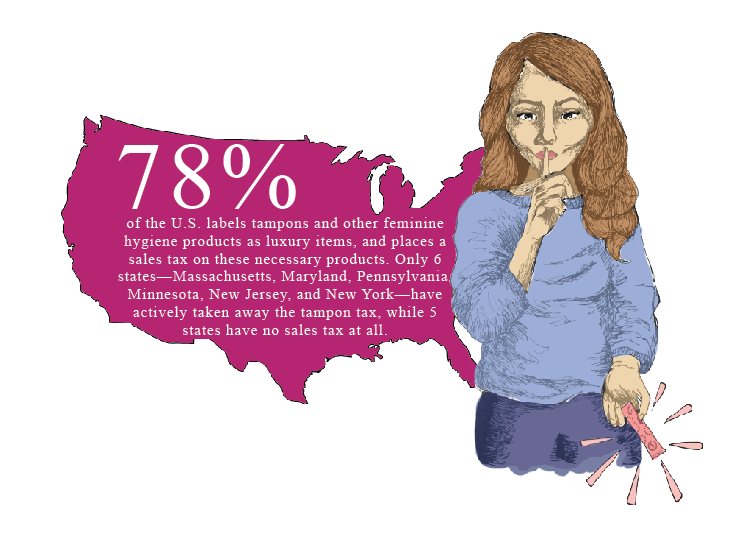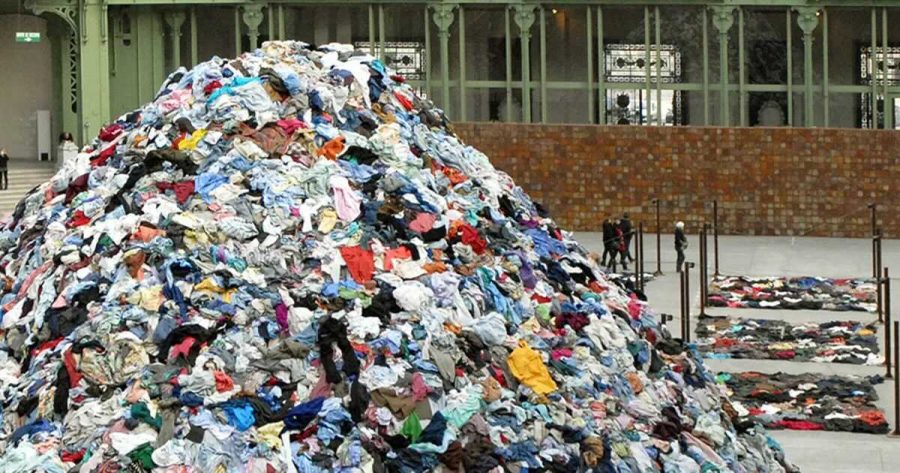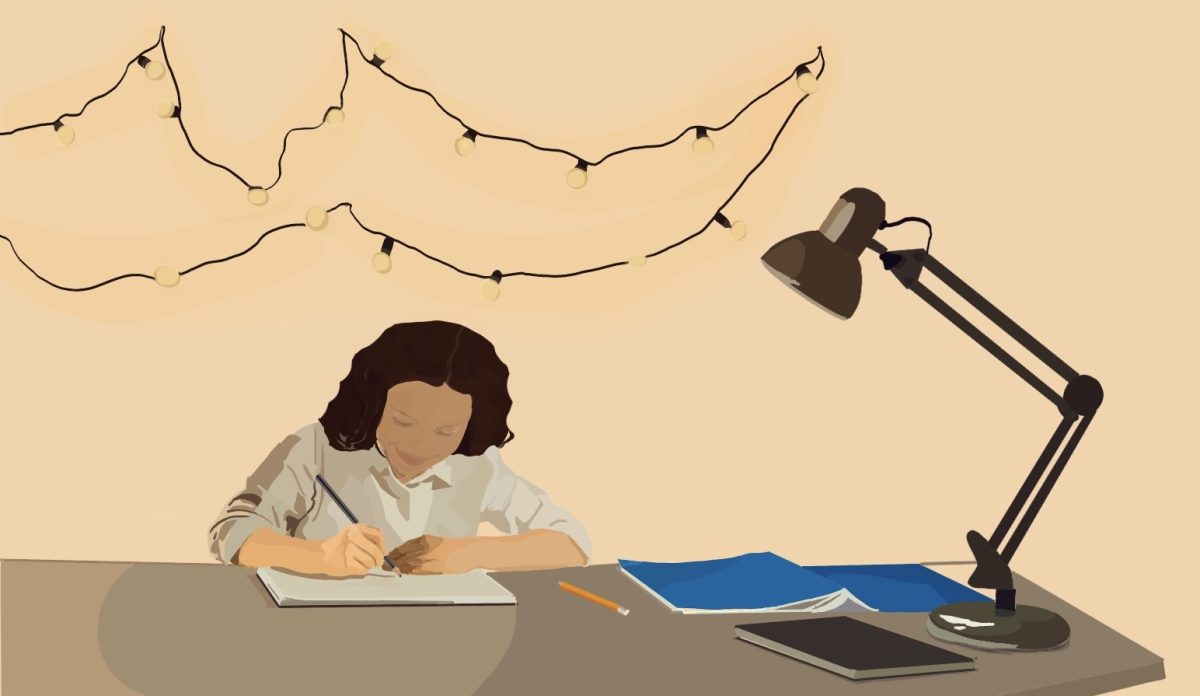At some point in the fifth grade, teachers separate boys and girls into different rooms to give them the talk—the puberty talk. Girls talk about girl stuff and boys talk about boy stuff. There’s little to no open conversation with both genders—until middle school. During the awkward sixth through eighth grade years when boys and girls sit down together and learn about reproductive health, both genders experience awkwardness and even shame because they naturally assume the topic is not for a public space. Consciously or unconsciously, society perpetuates the stigma surrounding periods. In recent years, movements such as Free The Tampons and Distributing Dignity have attempted to destigmatize this topic by increasing access to period products for impoverished women and women in the workplace. The Rebellion recently conducted a survey about the stigma in Walpole and at Walpole High School. After being open for 24 hours, the survey closed with 350 respondents: 238 female, 90 male, 14 other, and 7 prefer not to say. Here are the results.
A Societal Stigma:
Although the menstruation conversation is a regular right of passage for every girl, society (girls and boys alike) publicly prefers to remain quiet about it. Unfortunately, this silence has consequences on the international, national, and local levels.
In India, girls actually drop out of school due to their periods. In Sugata Roy’s article on the Unicef India website, Roy describes how periods are seen as dirty, feminine products and separate bathrooms cannot be found in many schools, and girls are discouraged from attending during their period.
George Jessunesan, the headmaster at M.C.Palli Girls High School, stated, “Over two-thirds of girls studying in standard 8 and 9 skipped schools during their periods. This hampered their studies and eventually one-third of these girls would drop-out.” The period problem does not just affect girls in India—UNICEF reported that 83 percent of girls in Burkina Faso and 77 percent in Niger have no place at school to attend to their menstrual needs. Moreover, this limitation threatens the basic right to education for girls in several foreign countries.
Although Americans do not face the same severe consequences, the stigma still makes women and men uncomfortable in schools and in the workplace. Nationally, organizations such as Free the Tampons use social media to destigmatize the period and encourage free access to tampons in public bathrooms. Founded by Nancy Kramer, this movement commissioned surveys and studies on this stigma in the workplace. In one of these interviews, a 39-year-old woman stated that the most stressful part of having her period at work is hiding it. “You have to make it past all your noisy male co-workers who are watching you go back and forth to the restroom,” she said.
Students at Walpole High School share similar discomforts. In the Rebellion survey, one female respondent commented, “Girls are self conscious that someone will hear them opening a pad in the GIRLS bathroom or [see them] putting a tampon in their pocket.” Other respondents expressed similar sentiment: “I am often extremely nervous of what people will think while I am on my period even if I have not made it known,” said one girl. Another female respondent stated, “I stayed home the day I got my period for the first time because I was embarrassed and didn’t know what to do with it.”
Several male respondents expressed disapproval (or at least discomfort) about the topic of periods by leaving comments such as “lol” and “not a fan rebellion wyd” and “weird topic” and “why tho?” and “is this really the most pressing issue that could be thought of for a survey.”
Although it’s evident that boys experience a higher level of discomfort when it comes to discussing periods, both genders consider period-talk to be socially unacceptable, a taboo that should not be discussed in public. However, period talk should not remain shrouded in silence.
An Involuntary Investment:
Too often, because of cost and the societal stigma surrounding the period, tampons and pads are not as accessible as they should be. However, groups like Free the Tampons and Distributing Dignity are advocating for increased accessibility for all women.
Women who unexpectedly get their period are often left stranded in a bathroom with empty tampon and pad dispensers. A recent study conducted by Free the Tampons shows that 86% of respondents have begun their period in public, and did not have the supplies that they needed. The Rebellion survey mirrored these results, revealing that 83% of respondents at Walpole High School have unexpectedly begun their period in school. In situations like these, 79% percent of women in the Free the Tampons study admit creating a makeshift pad from a wad of toilet paper, an unsanitary but sometimes essential solution. 163 girls from WHS, over half of the survey respondents, admitted to doing the same.
All public bathrooms should be stocked with free pads and tampons. In the same way that the government requires all bathrooms be stocked with toilet paper, it should require that all public bathrooms are also stocked with free feminine supplies. A common assumption is that women would take advantage of a free supply; however, why would women need to stock up on free tampons and pads if these products were readily available to them in every bathroom?
An overwhelming 94% of females who responded to the Rebellion survey agree that school bathrooms should be stocked with free pads and tampons.
Although there are pad and tampon dispensers currently in the WHS girls bathrooms that dispense products for 25 cents, these dispensers in the high school have not been filled for many years. Even if these dispensers were filled, who carries quarters to the bathroom anyways? The only other option available is visiting the nurse, which only 15% of girls are completely comfortable doing, most likely because they are embarrassed to ask.
Girls at Walpole High should have access to feminine supplies without having to go to the nurse. Our school should provide free, convenient access to pads and tampons, or at least stock the dispensers we already have.
For a product that all women cannot live without, the bloated expense of tampons is especially unfair for homeless or impoverished women.
Both tampons and pads average at five dollars a box; however, most brands are much more expensive, as popular brands such as Playtex or Kotex cost upwards of $10.00. In an article in the Huffington Post, Lifestyle Editor Jessica Kane calculated that tampons alone, excluding the cost of pain medication, heating pads, new underwear, and other products, cost around $1,773.33 for a woman in her lifetime. This average does not account for how early a woman’s period begins in her life, how long her cycle is, how heavy her flow is, or the brand she chooses to use. With the more brands costing $10.00 per box, a woman could spend upwards of $4,000. Simply put, the cost of tampons over a lifetime most likely adds up to much more than a homeless woman can afford.
To fix this problem, Distributing Dignity—a nonprofit organization that donates bras, pads and tampons to homeless shelter—works to lessen this burden. Joanie Balderstone and Rebecca McIntire, the founders of Distributing Dignity, understand the difficulties that homeless women across the country face on a regular basis. Balderstone and McIntire have found that the most needed donations were pads and tampons. Why is this the case? Because the price of period products is so expensive that homeless women cannot afford to take care of themselves. The ability to manage one’s own hygiene is a basic human right, and the high cost of tampons is stripping many women of that right.
In addition to the high cost, 39 states currently charge sales tax for pads and tampons.
In many of these states, certain items—chapstick, condoms, rogaine, adult diapers—are considered medical necessities and are not taxed; however, tampons and other feminine hygiene products are labeled as luxury items and are not exempt from the sales tax. Only six states have active taken away this tax on tampons: Massachusetts, Maryland, Pennsylvania, Minnesota, New Jersey, and New York. An additional five states have no sales tax in general. Although the tampon tax does not directly affect residents of Massachusetts, the tax symbolizes not only the stigma surrounding periods, but also the economic unfairness placed on women.
A Chain Reaction:
By conversing more about periods, we can destigmatize the topic of menstruation. This acceptance sets off a chain reaction: if we can talk openly about periods, we can fight against the overpriced cost and taxation of tampons. We can push for WHS bathrooms (and public bathrooms everywhere) to be stocked with period products. By opening up this movement, we can begin to combat the social stigmas surrounding periods, and we can foster openness and acceptance on a global level. It’s time to break the stigma surrounding menstruation. Revisit the Girl Talk—not with discomfort or dishonesty, but with candor and an open mind.















John Wilson • Dec 31, 2021 at 2:25 pm
Totally agree